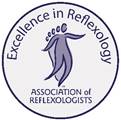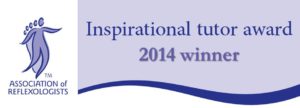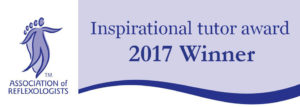Home
S.E.G Awards 5 Unit Level 3 Diploma in Reflexology
COURSE OVERVIEW
The Devon School of Reflexology was established in 1992 by Jane Holt, who was one of the pioneers of Reflexology in the South West.
Long standing Accredited Center of the Association of Reflexologists( Leading to full membership of the Association of Reflexologists ) providing training in professionalism and excellence as an A.O.R Approved center offering the Level 3 diploma in reflexology with S.E.G Awards.
Provides full training in Reflexology with a view to Clinical based Reflexology.
Support in client care and continual professional development ( CPD ) after Qualification with Beginner, Refresher and Advanced Courses available online Home | Sarah Jane Holt Reflexology | Devon
Business practice for Complementary Therapies.
Principles and practice of Complementary Therapies.
Knowledge of anatomy, physiology and pathology for Complementary Therapies.
Supervision and on-line support.
Courses are available as 1 year full time,running twice annually in the Spring & Autumn.
Course venues are the Exeter Natural Health Centre and the Totnes Natural Health Centre (tnhc.co.uk)
All Courses will be taught by the award winning Principal and Tutor,Sarah Jane Holt.
For further information or to apply for a Student Information Pack please email devonreflexology@hotmail.com
COURSE DURATION
Courses are taught over twelve teaching days, usually Sundays, over the duration of 12 months.
Online learning and support via Zoom meetings, as well as films of both lectures and practical techniques are available to help students at home with self-study outside of Teaching days.
The qualification has been allocated 100 guided learning hours tutorial time and a minimum of 60 practical home study hours and 100 hours of theoretical practice for completion.
COURSE DETAILS
*The Devon School of Reflexology offers 3 courses of the Level 3 Diploma in Reflexology each year-beginning in both Spring and Autumn.
*This New Qualification is the National recognized standard of training required to gain both Insurance to practice and Full Membership of The Association of Reflexologists (A.O.R) with the letters M.A.R (member of the Association of Reflexologists ) gained after qualification.
THE LEVEL 3 DIPLOMA IN REFLEXOLOGY( 5 UNITS):
1. PROVIDE REFLEXOLOGY
2. PRINCIPLES AND PRACTICE OF COMPLEMENTARY THERAPIES
3. ANATOMY, PHYSIOLOGY AND PATHOLOGY
4. BUSINESS PRACTICE FOR SELF-EMPLOYMENT
5. HEALTHY EATING UNIT
*The Course has a number of transferable units within the Complementary Therapies Qualifications including the Level 3 Diploma in Anatomy, Physiology and Pathology, Business Practice and Knowledge of Complementary Therpaies.
*Coursework is set after each teaching day and undertaken by students as self-study outside of teaching hours.
*To complete the Qualification a Pass has to be achieved in all 5 units. Regular Tutorials throughout the course will ensure learners are on target to achieve the standard required.
*An estimated guided learning hours of self – study required has been given of around 20 hours per week throughout the year.
*All coursework is Continually Assessed by the Tutor and passes in all units are required to qualify.
Course workbooks are provided as part of the course and are published by The Write Idea:
1.THE COMPLETE GUIDE TO REFLEXOLOGY By Ruth Hull
2.ANATOMY AND PHYSIOLOGY for therapists and healthcare professionals By Ruth Hull
3.ANATOMY AND PHYSIOLOGY WORKBOOK By Ruth Hull
THE SYLLABUS
Theory includes :
*The History and Origins of Reflexology
*Concepts and Theories of how it works
*Zones and their relation to organs and functions
*Contra-indications
*Benefits of Treatments
*Reactions to Treatment
*Detailed Examination of the feet and what the feet can tell you- Recognizing potential problems.
*Professionalism (Client handling, Hygiene, Ethics, current advertising guidelines, Legislation)
*Anatomy and Physiology relating to Reflexology
*Pathologies-Diseases and Disorders and how to treat them through the feet
* The Holistic approach-The body mind connection.Why people become ill. Stress response and healing crisis.
*Case Studies
*Knowledge of other Complementary therapies.
*Business Studies- How to set up practice as a self-employed Reflexologist to include Insurance, Advertising and Accountancy)
*Hand Reflexology, Spinal Reflexology, Spinal Nerves, Cranial Nerves, Reproductive Reflexology, Meridian Therapy,Advanced techniques and CPD
* Latest in Research data of the efficacy of Reflexology
*Healthy Eating and the importance of Nutrition in regaining Health
Practical
*Physical examination of the feet
*Practical training in Reflexology techniques
*Linking Reflexes
*Hand Reflexology, Spinal Reflexology, Spinal Nerves, Cranial Nerves, Reproductive Reflexology, Reflexology Lymphatic Drainage techniques
*Introduction to advanced techniques and Meridian Therapy- working with Meridian lines and Acupressure points
*Case Studies taken with clients
Students will be given home study and written assignments after each teaching day. The student is required to complete and document sixty three treatments as Case studies treating six clients ten times and three one-treatment studies. Case histories have to be completed thoroughly for each patient and marked prior to the end of the course. The examiner will check all work is completed.
There will be continual assessments to grade the students. There will also be three 90 minute practical exams to include consultation and sixty three treatments to be checked by the examiner.
Students are recommended to obtain a first aid certificate as part of their training ( contact St. Johns Ambulance ) but this is optional.
ENTRY REQUIREMENTS
Basic numeracy and literacy skills are essential requirements. A previous knowledge of anatomy and physiology is beneficial such as biology GCSE or A-Level. A self-motivated and disciplined student will be accepted without these qualifications subject to an informal interview prior to the course or attendance to an Open Clinic.
Students are expected to undertake a minimum of 20 hours each week of self-study throughout the duration of the course. This includes reading, research, practice of Reflexology and completion of the case studies ( 63 treatments over 1 year).
COURSE FEES
The total cost of the 5 unit level 3 diploma in Reflexology is £2000.
The deposit of £500 must be paid before the start of the course and is non-refundable.
Twelve installments of £125 can be paid by standing order every month throughout the duration of the year.
The course fees include everything you need for the course including:
*A.B.C Awards exam registration fees
*Student Membership and Insurance of the A.O.R
*Course Workbooks
*Foot chart and Hand charts
*Folders, Clip Boards and Pens
*Organic Hand made Talc & Balm + Biodegradable Wipes
*Thai Massage Foot Stick
*Access to Online videos of lectures and Practical demonstrations
*Tuition and On-line support


